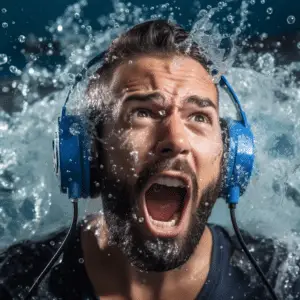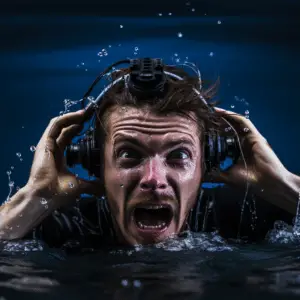Scuba diving can open you up to a number of different trials and tribulations that can be difficult to work through, from finding out how to calculate compressed air consumption to remove excess water in your ears. It is important that you are well researched in terms of what to do in a diving crisis so that you can help preserve your own and your teammate’s safety and good health.
Water build-up and how long it lasts

If you are an avid scuba diver, you may find that fluid and water build up in your ears are a serious issue that you face regularly. Obviously, for those who spend significant amounts of time in the water, it is normal to experience water in your ears. However, if it is causing you pain or discomfort, I would recommend that you seek treatment and advice from a professional to ensure that you are kept in peak physical condition. In a normal situation, any water that you can feel lingering in your ears should dissipate within a few hours to a couple of days maximum, if you find that there is fluid in your ears for longer than this, then it could be a sign of infection, and medical advice should be sought after immediately.
Can age affect this?
If you are an older citizen who still enjoys partaking in water sports activities like scuba diving, then it is likely that you will experience trapped water more often than those who are younger. With age, there are many factors to consider if you are going to continue safely doing activities like this, including making sure that every part of your body is looked after. Although there is no maximum age for scuba diving, older divers should be doing everything they can to ensure they are safe and healthy enough to continue. This includes avoiding any medical complications caused by water trapped in the ears.
Issues That Can be Caused by Trapped Water.
Long-term water in your ears can create infections, severe aches, altered hearing, and fluid, which is the largest issue. This issue must be addressed immediately to avoid more issues. Like any ailment, untreated it will progress. I recommend consulting a doctor for watery ears.
Water in your ears can create tinnitus, a ringing sound and impaired hearing. Professionals consider tinnitus a symptom because it can develop differently. Fluid buildup in the ears can be uncomfortable, but tinnitus or pain may indicate a more serious issue.
You may not know that water in your ears affects your coordination and balance, so you may have problems moving. Water in the ears can affect the body, surprising those with these conditions.
How to Get Rid of Water in Your Ears
You must treat retained water in the ears before it becomes an infection. Scuba divers and other water enthusiasts can use this information to avoid medical emergencies. Shaking and tipping your head releases much of the surplus fluid when you first exit the water. This easy tip can prevent future medical issues, so use it every time you leave the water.
If the ear has a lot of trapped water, you may need alternative methods to reduce the pain. If gravity cannot remove the water, try the Valsalva maneuver, or popping your ears. Hold your nose and blow into it to relieve stored water and pressure. If you blow too hard, this technique may do more damage.
A hairdryer is one of the greatest ways to completely dry ears. Considerations should be made first. Hold a hairdryer at a safe distance and gently apply the lowest heat setting to the affected area. If water persists in the ear after this approach, it may be a more significant issue that requires more drastic treatment.
Treatment For Any Prolonged Issues

The ears are one of the most delicate body components. One erroneous move when treating this area could harm your health and hearing. This is why you need professional guidance in uncertain times. Avoid doing anything to your ears without appropriate investigation. Water in your ears after a few days may indicate an ear infection. If you have ear pain, over-the-counter medicines are fine as long as you follow the amounts. Instead of suffering, see a doctor about stronger prescriptions if the pain persists.
Treatment for trapped water and other issues in your ears includes cold and warm compresses and swimmer drops to remove bacteria that could cause further illness. This type of infection usually goes away within a week. However, as indicated above, if you are unsure about anything, visit a specialist to ensure you are recovering properly.
Doctors may recommend letting ear infections recover naturally. For severe cases, antibiotics may be administered. Penicillin works well for mild infections. If you avoid medicines, your local pharmacy is your best chance for natural trapped water remedies.
